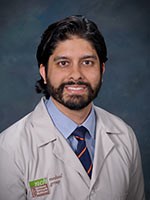How’s your colon health?
September 18, 2018
These tests can let you know
Colorectal cancer is the third most common cancer diagnosed in the United States. Colon cancer screening tests can save lives by detecting cancer early on and by preventing it. This Q & A, featuring Gastroenterologists Sandeep Mahajan, M.D. and Mayur Parepally, M.D., gives facts about various colon cancer screening tests and how they work.
What tests are available for colon cancer screening?

Dr. Mahajan: Patients should be informed that there are two general types of tests that screen and help detect colon cancer: visual testing (colonoscopy) and stool-based testing, such as Fecal Occult Blood Test (FOBT) Fecal Immunochemical Test (FIT) and stool DNA.
Colonoscopy is still considered the single best test to detect polyps and prevent colorectal cancer due to the ability to see the entire colon. Identified polyps can then be removed during the colonoscopy. Colonoscopies are recommended starting at the age of 50. Some experts recommend that African Americans should screen at age 45. If you have a family history of colon cancer, then you may need it at an earlier age.
Colonoscopy Expectations: Either your primary care provider or a gastroenterologist will give you the instructions to prepare for the colonoscopy. You would need to modify your diet the day before the colonoscopy. A colon cleanse is required the night prior and morning of the procedure (to better help identify polyps that can be removed). It is a same-day procedure, which takes 20 to 30 minutes. Patients are usually sedated for the examination.
After the procedure, you will wake up in the recovery unit and should be able to go home within one hour. A ride home is required after the procedure. Your gastroenterologist will then give you his/her recommendation to follow up.
What are polyps?

Dr. Parepally: Polyps are abnormal tissue growths in the colon. Some types of polyps are precancerous and can cause trouble down the road, which is why we remove them during a colonoscopy. When someone has a precancerous polyp, they may develop more in the future so we recommend that they come back sooner for a repeat exam.
What are the stool-based tests on the market?
Dr. Parepally: The Fecal Immunochemical Test (FIT) test and FIT-DNA tests are the two main mail-order kits available for colon cancer screening. They involve testing a stool sample. You package that sample and mail it back, and that test result comes back in about two weeks.
How can you get one?
Dr. Parepally: Stool-based testing can be ordered by your primary care provider or gastroenterologist.
Why would a patient opt for a test other than a standard colonoscopy?
Dr. Mahajan: There are different reasons to pursue each testing. Sometimes the anatomy of patients may make it more difficult to perform a colonoscopy, or they don’t want to go through a procedure that can require sedation.
Dr. Parepally: Non-invasive tests may be better in situations when patients are at higher risk for undergoing a procedure, such as when they’ve been recently ill. That’s a discussion patients should have with their doctor.
What do stool-based tests detect?
Dr. Mahajan: The FIT test detects hidden blood in the stool. The FIT-DNA test measures DNA molecular markers and this increases the sensitivity of detecting large polyps and/or cancer. The FIT test is recommended every year and the FIT-DNA test – also called Cologuard® – is recommended every three years.
Are there drawbacks to these tests?
Dr. Parepally: None of the mail-order tests are great at detecting polyps. Colonoscopy is our best way to detect these growths and remove them before they develop into cancer.
Are there other tests?
Dr. Parepally: A CT colonography is another method of detecting colon cancer. It’s a special type of CT scan where you have to drink a bowel prep to clear the colon out and then you drink a contrast solution, which generates different types of images over a standard CT scan.
Is there any financial help for those who want to undergo testing but cannot afford it?
Dr. Parepally: The Cook County Health Department can help people who are underinsured or uninsured. Patients may work with a county case manager or social worker to help get coverage for these tests.
For more information on GI services call 847-725-8640. To see all of our gastroenterologists and learn more about our Digestive Disorders Center, visit nch.org/GI.